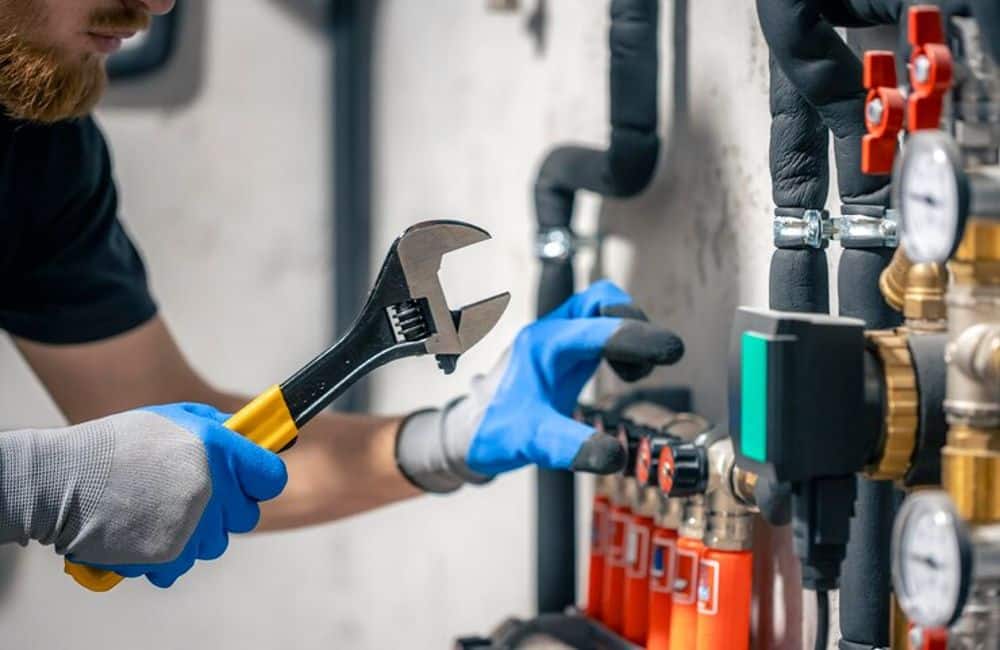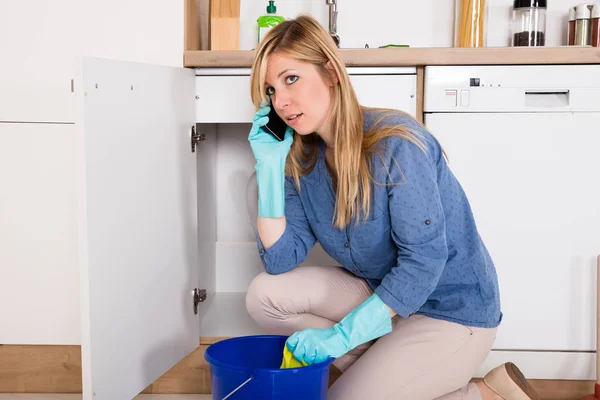This post listed below relating to What to Do While Waiting for an Emergency Plumber is immensely remarkable. You should read it.

Plumbing emergencies can strike at any moment, triggering anxiety and prospective damages to your home. Whether it's a burst pipeline, a clogged up drainpipe, or a dripping tap, recognizing just how to take care of the scenario till an expert plumbing technician shows up can conserve you from additional problems. This short article offers important emergency plumbing tips to aid you minimize damages and gain back control during a plumbing crisis.
Turn Off the Water
The very first step in any type of plumbing emergency situation is to shut down the water system. For localized issues, such as a leaking tap or bathroom, turn off the valve near the component. In the case of a major leakage or ruptured pipe, locate your home's major water shut-off shutoff and turn it off instantly. Recognizing the area of these valves beforehand can conserve important time during an emergency situation.
Turn off Your Water Heater
In particular emergency situations, such as a burst pipeline, it's a good idea to shut down your hot water heater. This prevents getting too hot or damage to the unit when water quits flowing. Switch off the power supply to the water heater (electrical or gas) and allow it cool down to stay clear of potential threats.
Briefly Stop a Ruptured Pipe
A ruptured pipe can bring about considerable water damages in minutes. To minimize the problem:
- Clamp or Cover the Pipeline: Use a pipeline clamp, rubber, or air duct tape as a momentary seal.
- Divert Water Circulation: If possible, divert the water right into a bucket or container to limit damage to bordering areas.
- Maintain the Area Dry: Usage towels or a wet/dry vacuum cleaner to eliminate standing water.
- Call a specialist plumbing promptly to address the issue completely.
Have an Emergency Pipes Kit
Prepare a fundamental pipes emergency set to take care of minor problems properly. Your kit must consist of: - Adjustable wrench
- Plumber's tape
- Pipe secures
- Towels and rags
- A bettor
- Epoxy putty
- Pail.
- Having these tools available can make a substantial difference in your ability to handle emergency situations.
Unclog Drains Safely.
A stopped up drainpipe can be an irritating and messy issue. Here's how to tackle it:. - Use a Plunger: For sinks or toilets, a plunger can often dislodge small blockages. Guarantee you utilize the right kind of plunger for the fixture.
- Hot Water and Dish Soap: For grease-related clogs, pour a combination of warm water and recipe soap away to separate the grease.
- Avoid Chemical Drain Cleaners: While tempting, chemical cleansers can create even more damage than great, especially to older pipes.
- If these methods do not function, prevent utilizing extreme force, as it might get worse the obstruction.
Handle Overflowing Toilets.
An overflowing toilet can create instant mayhem. Here's what you need to do:. - Quit the Water Flow: Remove the container cover and push down on the flapper valve to quit water from going into the bowl. Switch off the water system to the bathroom if necessary.
- Dive Carefully: Use a commode bettor to clear the clog, however avoid hostile plunging, which can trigger splashing or more damage.
- Contain the Spill: Usage towels or a mop to tidy up water swiftly to prevent floor covering damage.
Address Tiny Leaks with Temporary Solutions.
Small leakages can rapidly come to be considerable problems if left untreated. Use these short-lived repairs till expert aid shows up:.
- Pipeline Tape or Epoxy Putty: Apply water-proof tape or epoxy putty to temporarily secure the leak.
- Rubber and Clamp Approach: Wrap an item of rubber or an old inner tube around the leak and safeguard it with a hose pipe clamp or air duct tape.
- Buckets or Towels: Area buckets under the leakage to have water and avoid damages to flooring or furnishings.
- While these fixes aren't long-term, they can aid minimize water loss and damages.
Take Care Of Frozen Pipeline Meticulously.
In colder environments, icy pipes are a typical emergency situation. If you suspect a frozen pipeline:. - Turn Off the Water: Turn off the major water supply to prevent a ruptured pipeline.
- Thaw Slowly: Utilize a hairdryer, hot pad, or warm towels to thaw the pipe slowly. Stay clear of open flames or extreme warm, as these can harm the pipeline.
- Inspect for Leaks: Once the pipeline is defrosted, look for cracks or leaks before turning the water back on.
Know When to Call an Expert.
While quick fixes can help briefly, particular pipes issues require instant expert focus. Call a plumber if:.
- A ruptured pipe causes comprehensive flooding.
- Drains or bathrooms continue to be clogged up regardless of your initiatives.
- You see persistent leaks or water pressure issues.
- Your water heater is leaking or malfunctioning.
- Quickly getting in touch with a professional makes certain the concern is resolved appropriately and protects against further complications.
Prevent Further Damage.
Taking fast activity to decrease damages can conserve you money and time in the future. Right here's exactly how:. - Move Valuables: Remove furniture, electronics, and various other things from the damaged location.
- Use Sandbags: For flooding situations, place sandbags around the area to reroute water.
- Shut down Power: If water has actually reached electrical outlets or appliances, turn off the power to stop shocks or fires.
Final thought.
Plumbing emergencies can be frustrating, yet with the ideal understanding and tools, you can take care of the scenario successfully until help gets here. By shutting off the supply of water, addressing tiny leakages, and using short-lived repairs, you can decrease damage and maintain your home safe. Keep in mind, these pointers are momentary solutions; always consult a certified plumbing professional to manage the source of the trouble. Prep work and quick reasoning are your best allies in any kind of plumbing emergency situation.
Expert Tips for Emergency Plumbing Repairs
Plumbing emergencies can be incredibly stressful and inconvenient. Whether it’s a burst pipe, a clogged drain, or a leaky faucet, these common plumbing emergencies need immediate attention to prevent further damage to your home. But before you panic, it’s important to understand the basics of plumbing repairs and the steps you can take to address these emergencies. In this article, we will share some expert tips to help you navigate through these situations and minimize potential water damage.
Identifying Common Plumbing Emergencies
- Leaky pipes and faucets
- Clogged drains and toilets
- Burst pipes
- Low water pressure
- Water heater problems
Essential Tools for Plumbing Repairs
- Plunger: Useful for unclogging toilets and drains
- Adjustable wrench: Needed for tightening or loosening nuts and bolts
- Pipe wrench: Ideal for gripping and turning pipes
- Tape measure: Necessary for accurate pipe measurements
- Plumber’s tape: Helps create watertight seals
Understanding Emergency Plumbing Services
Emergency plumbing services are designed to provide immediate assistance for unexpected plumbing issues that can cause significant damage to your home, business, or health. These services are typically available 24/7 and are staffed by experienced plumbers who can quickly diagnose and repair a wide range of plumbing problems.
When a plumbing emergency strikes, time is of the essence. Whether it’s a burst pipe flooding your basement or a gas leak posing a serious risk, emergency plumbing services ensure that help is just a phone call away. These professionals are equipped with the tools and expertise to handle any situation, minimizing damage and restoring your plumbing system to proper working order.
What Constitutes a Plumbing Emergency?
- Burst pipes or water supply lines: These can cause extensive water damage and need immediate repair to prevent flooding.
- Gas leaks or suspected gas leaks: Gas leaks are extremely dangerous and require prompt attention to avoid potential explosions or health hazards.
- Sewer backups or overflows: These can lead to unsanitary conditions and significant property damage.
- Clogged drains or toilets causing water to overflow: Overflowing water can damage floors, walls, and other structures.
- Leaks or water damage causing structural damage: Persistent leaks can weaken the structural integrity of your home or business.
- No hot water or heating: A lack of hot water can be more than an inconvenience, especially in colder months.
Common Causes of Plumbing Emergencies
- Aging or corroded pipes: Over time, pipes can deteriorate, leading to leaks or bursts.
- Improperly installed or maintained plumbing fixtures: Faulty installations or lack of maintenance can result in unexpected failures.
- Tree roots or other debris infiltrating your sewer line: Roots can grow into pipes, causing blockages and backups.
- Frozen pipes or water supply lines: In colder climates, pipes can freeze and burst, leading to significant water damage.
- High water pressure or sudden changes in water pressure: Excessive pressure can strain pipes and fixtures, causing them to fail.
- Natural disasters such as floods or earthquakes: These events can disrupt your plumbing system and cause severe damage.
Steps to Minimize Water Damage
- Locate the water shut-off valve: Knowing where the valve is can help you quickly cut off the water supply to the affected area.
- Turn off the water heater: If there’s a risk of water coming into contact with the heating element, make sure to turn off the water heater to avoid potential accidents.
- Open faucets and drain pipes: By opening faucets and drain pipes, you can relieve pressure and empty any standing water.
- Collect and contain water: Use towels, buckets, or bins to collect water and prevent it from spreading to other areas of your home.
https://leecountyplumbingandwellservice.com/expert-tips-for-emergency-plumbing-repairs/

I came across that page about Expert Tips for Managing a Plumbing Emergency Until Help Arrives when browsing on the web. Do you know somebody else who is involved in the subject? Please feel free to promote it. Thanks for your time spent reading it.
More Details
Comments on “Emergency Plumbing Tips: Actions to Follow Until A Plumber Arrives”